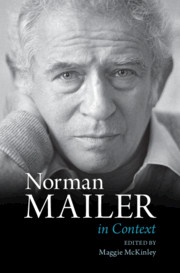37 results
Notes on Contributors
-
- Book:
- Norman Mailer in Context
- Published online:
- 05 August 2021
- Print publication:
- 26 August 2021, pp ix-xv
-
- Chapter
- Export citation
Part VI - Profiles and Literary Biographies
-
- Book:
- Norman Mailer in Context
- Published online:
- 05 August 2021
- Print publication:
- 26 August 2021, pp 291-332
-
- Chapter
- Export citation
Index
-
- Book:
- Norman Mailer in Context
- Published online:
- 05 August 2021
- Print publication:
- 26 August 2021, pp 396-400
-
- Chapter
- Export citation
A Note on References and Abbreviations
-
- Book:
- Norman Mailer in Context
- Published online:
- 05 August 2021
- Print publication:
- 26 August 2021, pp xvi-xviii
-
- Chapter
- Export citation
Part I - Literary Influences
-
- Book:
- Norman Mailer in Context
- Published online:
- 05 August 2021
- Print publication:
- 26 August 2021, pp 11-46
-
- Chapter
- Export citation
Chapter 20 - Violence
- from Part IV - Philosophical and Cultural Contexts
-
-
- Book:
- Norman Mailer in Context
- Published online:
- 05 August 2021
- Print publication:
- 26 August 2021, pp 223-233
-
- Chapter
- Export citation
Selected Secondary Bibliography
-
- Book:
- Norman Mailer in Context
- Published online:
- 05 August 2021
- Print publication:
- 26 August 2021, pp 391-395
-
- Chapter
- Export citation
Part VII - Mailer’s Legacy
-
- Book:
- Norman Mailer in Context
- Published online:
- 05 August 2021
- Print publication:
- 26 August 2021, pp 333-388
-
- Chapter
- Export citation
Part II - Form and Genre
-
- Book:
- Norman Mailer in Context
- Published online:
- 05 August 2021
- Print publication:
- 26 August 2021, pp 47-124
-
- Chapter
- Export citation
Copyright page
-
- Book:
- Norman Mailer in Context
- Published online:
- 05 August 2021
- Print publication:
- 26 August 2021, pp iv-iv
-
- Chapter
- Export citation
Part V - Gender and Sexuality
-
- Book:
- Norman Mailer in Context
- Published online:
- 05 August 2021
- Print publication:
- 26 August 2021, pp 257-290
-
- Chapter
- Export citation
Afterword
- from Part VII - Mailer’s Legacy
-
-
- Book:
- Norman Mailer in Context
- Published online:
- 05 August 2021
- Print publication:
- 26 August 2021, pp 384-388
-
- Chapter
- Export citation
Introduction
-
-
- Book:
- Norman Mailer in Context
- Published online:
- 05 August 2021
- Print publication:
- 26 August 2021, pp 1-10
-
- Chapter
- Export citation
Primary Bibliography
-
- Book:
- Norman Mailer in Context
- Published online:
- 05 August 2021
- Print publication:
- 26 August 2021, pp 389-390
-
- Chapter
- Export citation
Part III - Political Contexts
-
- Book:
- Norman Mailer in Context
- Published online:
- 05 August 2021
- Print publication:
- 26 August 2021, pp 125-180
-
- Chapter
- Export citation
Contents
-
- Book:
- Norman Mailer in Context
- Published online:
- 05 August 2021
- Print publication:
- 26 August 2021, pp v-viii
-
- Chapter
- Export citation
Part IV - Philosophical and Cultural Contexts
-
- Book:
- Norman Mailer in Context
- Published online:
- 05 August 2021
- Print publication:
- 26 August 2021, pp 181-256
-
- Chapter
- Export citation

Norman Mailer in Context
-
- Published online:
- 05 August 2021
- Print publication:
- 26 August 2021
Part VIII - Roth’s Legacy
-
- Book:
- Philip Roth in Context
- Published online:
- 15 July 2021
- Print publication:
- 22 July 2021, pp 345-390
-
- Chapter
- Export citation
Primary Bibliography
-
- Book:
- Philip Roth in Context
- Published online:
- 15 July 2021
- Print publication:
- 22 July 2021, pp 391-392
-
- Chapter
- Export citation

